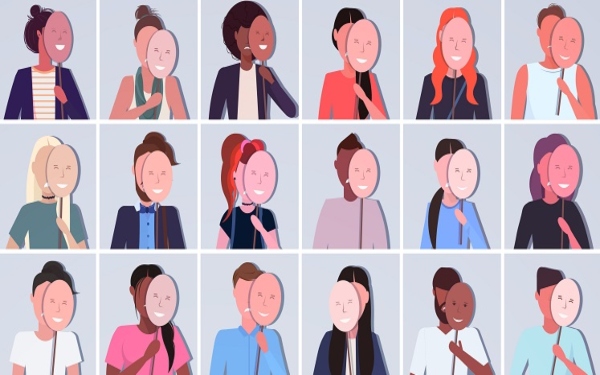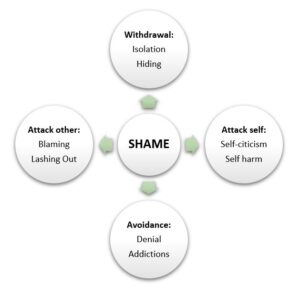
 This article presents a few key pieces of advice from Community Care Inform Children’s guide on shame and how it may present in children and parents. The full guide looks at the role shame might play in a child’s life and provides guidance for practitioners on how to minimise its ongoing effects. The guide explores theoretical frameworks that can help us understand shame and approach direct work with children and families where there are behavioural presentations of shame. Community Care Inform Children subscribers can access the full guide here.
This article presents a few key pieces of advice from Community Care Inform Children’s guide on shame and how it may present in children and parents. The full guide looks at the role shame might play in a child’s life and provides guidance for practitioners on how to minimise its ongoing effects. The guide explores theoretical frameworks that can help us understand shame and approach direct work with children and families where there are behavioural presentations of shame. Community Care Inform Children subscribers can access the full guide here.
The guide was written by Laura Hanbury, a family practitioner who has worked in family support and child protection for over 15 years.
What is shame?
Shame is a very important concept to consider as it can often be at the root of many worrying behaviours in children and caregivers that social workers might encounter.
Shame has been described as a set of intense feelings, mainly concerned with an inner sense of feeling unworthy, unlovable, useless, and worthless. People cope and deal with shame in different ways, either by internalising, externalising or denying these feelings completely.
Shame-focused coping
The compass of shame model below (Nathanson, 1992) provides a starting point for understanding shame and behaviours that can develop because of it. This model illustrates four shame coping styles: withdrawal, attack-self, avoidance, and attack-other.

From Shame and Pride by D Nathanson (1992)
Examples of behaviours associated with the four coping styles may look like this:
Withdrawal
- Presenting in a depressed state and/or isolating themselves.
- Avoiding professionals and potentially being seen as ‘non-engaging’ or ‘avoidant’.
Attacking the self
- Putting themselves down and thinking of themselves as worthless.
- Using self-harming behaviours (this includes overeating and undereating).
Avoidance
- Presenting as though they are in denial.
- Behaviours that distract from feeling emotion, such as thrill-seeking or using/abusing drugs and alcohol (including prescription drugs).
Attacking others
- Lashing out verbally and/or physically, seemingly at random times.
- Being unable to take responsibility for their own actions and blaming others for any negative outcomes.
Access the full guide for more examples of behaviours that can present from shame-focused coping styles.
Working with shame
First, we have to recognise that families who become part of the child protection system often don’t have a choice about having services involved, so may well present a defensive response. Social workers and practitioners are therefore likely to witness shame-based coping styles and behaviours. In response, it is important to:
Be mindful of the language used
- Pay attention to the words and vocabulary that you use in assessments, case notes and direct work, as these can intensify feelings of shame.
- Avoid using too many acronyms and professional jargon – ensure the person you’re supporting understands and can relate to the words and phrases you are using.
- Ask yourself: ‘How does this use of language help to promote relationship-based practice in social work?’
Be aware of bodily responses and visual signs of shame
- Pay attention to body language and somatic presentations (eg is the person avoiding your gaze?).
- ‘Safety behaviours’ may signal shame (eg turning their face away, slumped posture, blushing, their mind going blank).
- Is there a repetitive somatic symptom that the person displays when discussing a specific topic (eg when discussing interpersonal experiences are they shaking their foot, playing with their hands, etc?)?
- Pay attention to who, where, and what children look at when you ask them a direct question.
If you recognise any sudden onset of the behaviours outlined above you can:
- Think about the conversation that occurred immediately before and ask yourself, ‘did I ask a question about a particular relationship?’ or ‘were they telling me a story about a previous relationship’?.
- Consider if the locations where you are having conversations trigger shame behaviours (ie home environment, sitting opposite each other). Try creating opportunities where eye gaze can be naturally averted, and consider having conversations in a different location that may be less intimidating (eg sitting in a park side-by-side rather than directly opposite each other).
Practice point
Before beginning direct work:
- Familiarise yourself and gain a good theoretical understanding of shame and coping behaviours and their links with trauma-informed practice and attachment theory. See CC Inform’s Attachment knowledge and practice hub or Trauma-informed knowledge and practice hub for more information.
- Explore your relationship with shame. Have you been shamed in the past? Is this affecting the way that you respond to families who are avoidant?
The full guide on shame includes more information about how shame can present itself throughout childhood and the life course, along with the relationships between shame, guilt and survival. If you have a Community Care Inform Children licence, log on to see the full guide and read more detailed information.






 Bournemouth, Christchurch and Poole
Bournemouth, Christchurch and Poole  Hampshire County Council
Hampshire County Council  Oxfordshire County Council
Oxfordshire County Council  South Gloucestershire Council
South Gloucestershire Council  Wokingham Borough Council
Wokingham Borough Council  Webinar: building a practice framework with the influence of practitioner voice
Webinar: building a practice framework with the influence of practitioner voice  ‘They don’t have to retell their story’: building long-lasting relationships with children and young people
‘They don’t have to retell their story’: building long-lasting relationships with children and young people  Podcast: returning to social work after becoming a first-time parent
Podcast: returning to social work after becoming a first-time parent  How managers are inspiring social workers to progress in their careers
How managers are inspiring social workers to progress in their careers  Workforce Insights – showcasing a selection of the sector’s top recruiters
Workforce Insights – showcasing a selection of the sector’s top recruiters 

 Facebook
Facebook X
X LinkedIn
LinkedIn Instagram
Instagram
Social work cases are complex, practice is complex ,we provide a service to vulnerable children who have experienced traumatic life experiences,this also includes the child’s parents.The child’s lived experience may become normal behaviour and expectations for the child. On initial contact it may not be clear how the child views the world and the impact on the child.Direct work with the child is therefore important to establish the child’s lived experience from thier point of view.
Social work pratice involves following guildlines,pratice procedures,theory based practice and research.Social workers carryout assessments to inform decision making and plans in respective of the child.Is it therefore not important that timescales and caseloads are realistic to support social workers carrying out the role we have trained to acheve.
Children and parents need to be informed why the assessment/intervention by social services is taking place and the possible outcomes.Parents need to understand at the begining of the assessment process/intervention that they may not understand the relevance of some of the question’s/intervention and that some of the question’s may be uncomfortable, they may not fully understand why the assessment is required even thought it is clear to the social worker.We must remember intervention will cause stress and possible embarrassment for the family and even the child dependant on the child’s age,each case circumstances will be different.
Social workers must be aware that assessments can trigger past and present negative experiences for the child and parent being assessed.This can lead to conflicts with the social worker which may deflect from the issue’s.
Understanding shame is so important in social work and for relationship based practice. Being a student social worker in a substance use service shame is often masks fear of the unknown or uncertainty and can be displayed in a variety of behaviours like non-engagement, lashing out or ambivalence or resistance to the support. Often because of the time constraints we may put it down to the client not being ready to engage but this goes against the premise of relationship-based practice where we just dismiss the client because they do not fit into our expectations. This is why it so important to be curious to understand the client and their circumstance, looking deeper to uncover what is causing the behaviour as all behaviour has a reason. For me understanding the compass of shame is really important as it help to ensure that interventions are trauma informed to effectively support the client holistically.